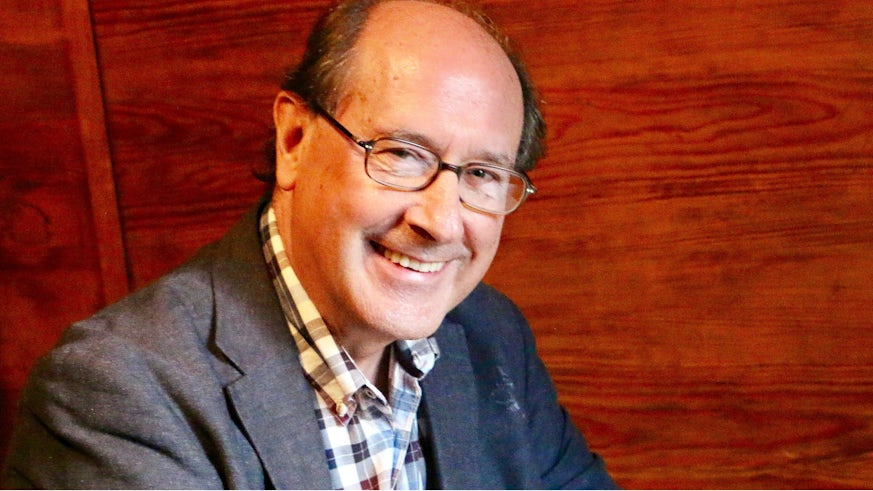Fellowship for pioneer of gravitational wave astronomy
10 May 2021

Professor Bernard Schutz, from Cardiff University’s School of Physics and Astronomy, has been made a Fellow of the Royal Society.
Professor Schutz has been awarded the Fellowship for his crucial contributions to gravitational wave astronomy.
Professor Schutz is one of the world’s leading experts on gravitational waves – tiny ripples in space time that are emitted from violent cosmic events – and has been influential in setting up the projects that have come to finally detect these events, as well as developing the scientific models describing what these events tell us about the Universe.
“It is a huge pleasure and honour to receive this recognition, coming as it does from such eminent scientists. It is also a recognition of how exciting and important this new field of gravitational wave astronomy has become,” said Professor Schutz on receiving the award.
His illustrious career spans over 50 years and has taken him all over the world to work alongside some of the greatest scientists of our generation.
Obtaining his PhD from the California Institute of Technology in 1971, he was supervised by the now Nobel Prize-winning physicist Kip Thorne, forming a close relationship that would later become significant in the development of the field of gravitational wave astronomy.
Professor Schutz then moved on to Cambridge University where he worked with the late Stephen Hawking and current Astronomer Royal Martin Rees.
After further work at Yale University, Professor Schutz arrived in Wales at what was then University College Cardiff in 1974.
It was at this time that Professor Schutz developed the theories that would later become the standard search tools for findings signs of gravitational waves within data, simultaneously helping to build a critical mass of gravitational wave research at Cardiff University.
It was in a 1986 paper that Professor Schutz showed how gravitational waves can be used to measure the rate at which the Universe is expanding, known as the cosmic expansion rate. He demonstrated that gravitational waves from collisions are “standard sirens” carrying information about their distance to Earth.
“Looking back at the beginnings of this work in Cardiff, I am very much indebted to my research students and postdoctoral colleagues who put so much enthusiasm and energy into laying the foundations for what was to come, and to the University for supporting and encouraging an activity that was not going to see its ultimate payoff until long into the future,” Professor Schutz continued.
He would have to wait 30 years until his theory was finally realised when both gravitational and electromagnetic waves were detected by the LIGO and Virgo collaboration, alongside a number of astronomical satellites and telescopes.
This was hot on the heels of the very first discovery of gravitational waves by the LIGO collaboration in 2015. The signal came from the collision of two black holes and has since been described as the most significant scientific discovery of the past 100 years.
Professor Schutz was instrumental in laying the foundation for LIGO in the 1980s, alongside his former mentor Kip Thorne, and has since been a driving force in the successful development of the collaboration, which now includes over 1,300 scientists from countries across the world.
Outside of his work in Cardiff, Professor Schutz moved to Germany in 1995 to become one of two founding directors of the Max Planck Institute for Gravitational Physics (Albert Einstein Institute) -- with over 300 staff, it is now the biggest research institute in the world devoted to gravitational science.
Retiring from that post in 2014, he returned to Cardiff University as a Professor in Physics and Astronomy and the first director of the University’s Data Innovation Research Institute.
Widely considered to be one of the highest honours a scientist can acquire, a Fellowship of the Royal Society is awarded to those who have made a “substantial contribution to the improvement of natural knowledge.”
Professor Schutz joins a pre-eminent group of physicists on the list, including Isaac Newton, Albert Einstein and Michael Faraday.
It is the latest in a long list of accolades that Professor Schutz has amassed throughout his career, in which he has been elected to the US National Academy of Sciences, become a Fellow of the American Physical Society, the Institute of Physics and the Learned Society of Wales, and has most recently been awarded the Eddington Medal from the Royal Astronomical Society and the 2020 Isaacson Prize in Gravitational Wave Science from the American Physical Society, to name just a few.
Professor Schutz talks about his Fellowship in the latest episode of the 'Pythagorean Astronomy' podcast. You can listen here.


